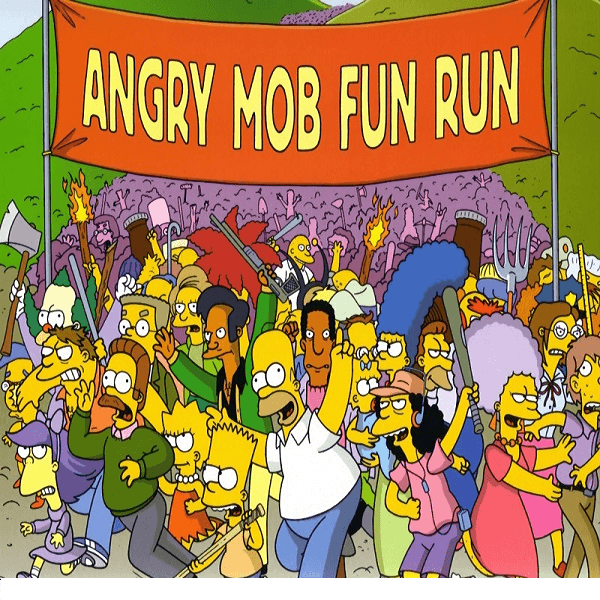What is the difference between mobbing and bullying? Both are prevalent forms of Narcissistic Abuse that target a preferred scapegoat, target, or victim. In either case, there is a ring leader. If they are bullying they might be doing it alone, but when Abusers manage to recruit Flying Monkeys to help them harm, embarrass, shame, or frighten a target then they are, in essence, guilty of inciting a clear form of socially sanctioned abuse utilizing an effective terror tactic known as mobbing. The only difference between the two pop psychology definitions is in the size of the pack, not the nature of the predator(s).
We all recognize the pattern and understand the cycle of abuse. A bully picks out a target who they either perceive as against them, weak, vulnerable or who they perceive in some way has offended them. They enlist the help of Flying Monkey followers and Enabling Henchmen to help them carry out attacks and smear campaigns. Some abuse may be situational and covert, while other parts of it are conducted very publicly to hurt. Active supporters take part in the bullying; passive supporters overlook abuse, minimize, and take great pleasure in being passive-aggressive enablers. Enablers and onlookers who get off on seeing other people’s pain will openly show signs of supporting both the abuse continuing and the Abuser. They tend to blame the victim for being abused, claiming the party being terrorized deserved it.
Bullying (as a verb enacted by a single individual against another sentient being or group of beings or as mobbing) is Narcissistic Abuse, plain and simple. Back in the days of old, townspeople may have been rallied together and hyper-stimulated to act aggressively against a person or group readily identifiable by stereotype or common interest. Pitchforks, clubs, and other menacing weapons like lit torches were carried and brought to terrorize their person of interest. In modern times, schoolyard bullying starts the trend; toxic teens or adults acting like Flying Monkeys promoting the cause of a Narcissist or narcissistic person keep the cycle of Narcissistic Abuse going using behind the scenes gossip, stonewalling, snubbing, and cyber-bullying on social media.
The modern shaming, ridiculing, and attack meme has replaced crosses being burned in yards in many instances. The difference is when people mature chronologically, most mature emotionally and socially. Narcissistic predators, on the other hand, tend to either become Covert Narcissists (people who manipulate and display passive-aggressive tendencies) or Overt Narcissists as they age. Noting they tend to act with little to no empathy, display a sadistic streak to their nature, and pervasively act in such ways that expose both competitive and egocentric thinking, bullies of all kinds tend to band together in toxic peer groups.
Very seldom will you see a peer group of loving people enable one of their members to caustically antagonize another person or rail against sub-cultures stereotypically. What you will see among peers who are individuals of goodwill is that other people are treated with respect — and when and if a bad habit of thinking reveals itself (such as an entitlement issue having been taught and passively embraced), friends offer alternative or fresh perspectives while helping a thinker understand that while their knowledge may have served them for a period of time, that nowadays there might be a better strategy to PC embrace.
We’re not talking about mind control here or passive acceptance of other people’s ways. We’re talking about Darwinian social and emotional evolution of human minds on a grand, more timeless cosmic growth and introspection scale.
Bullying — a.k.a. abusing — is something a person with a self-centered nature can do to anyone — and most people with personality disorder tendencies indulge their own sadistic streak by doing it on a regular basis. When bullies bring friends, family, or co-workers into the mix to help them harass, shun, embarrass, hurt, intimidate, frighten, or scare a target, the dynamic shifts to what modern psychologists (primarily in Europe) call “mobbing”, noting that abusive personalities looking to gang up with other abusive people and enablers tend to exhibit predatory, pack-like behaviors when they have narcissistic personalities by nature.
Narcissistic people who abuse, enable, pot stir, cheer on, or otherwise support those who lead in menacing are not only psychologically immature, they are a danger to themselves and others. They are a danger to others for obvious reasons but risk landing themselves in hot water by pledging allegiance to stronger predators with the expectation the tides will never turn on themselves. Loyalty is not something understood by egocentric people. Flying Monkeys typically remain aligned to promoting Narcissistic interests until they themselves are targeted for social harm by irrational, angry, or mistrustful pack leaders.
According to Bully Online, “The word bullying is used to describe a repeated pattern of negative intrusive violations [behaviors] against one or more targets and comprises constant trivial nit-picking criticism, refusal to value and acknowledge, undermining, discrediting and a host of other behaviors…” that are caustic to any victim or witness. Nearly every person on the planet has been bullied or targeted for social and emotional abuse at one time or another, but it’s crucial to note that just because something has become a common social habit does not mean that 21st-century humans cannot or should not aspire to do better.
People who bully others come in all ages, shapes, colors, makes, and sizes. There is no one cultural group that bullies more or less than another; all human civilizations have people in their midst who have a propensity to engage in covert or overt bullying, though some cultures promote, enable, and encourage bullying more than others.
“The word mobbing [itself] is preferred to bullying in continental Europe and in those situations where a target is selected and bullied (mobbed) by a group of people rather than by one individual. However, every group has a ringleader. If this ringleader is an extrovert it will be obvious who is coercing group members into mobbing the selected target. If the ringleader is an introvert type, he or she is likely to be in the background coercing and manipulating group members into mobbing the selected #target; introvert ringleaders are much more dangerous than extrovert ringleaders.”
PsychCentral claims workplace bullying — or mobbing — is on the rise in modern culture. The problem is not something uniquely American. Globally, workplace bullying and mobbing events, in general, are on the rise. The site notes, “Mobbing is “bullying on steroids,” a horrifying new trend whereby a bully enlists co-workers to collude in a relentless campaign of psychological terror against a hapless target.”
The source further noted, “Targets are usually anyone who is “different” from the organizational norm. Usually, victims are competent, educated, resilient, outspoken, challenge the status quo, are more emphatic or attractive, and tend to be women, aged 32 to 55. Targets also can be racially different or part of a minority group.” They add, “The target receives ridicule, humiliation, and eventually, removal from the workplace. It leaves the victim reeling with no idea what happened or why. It takes away a person’s safety in the world, dignity, identity and belonging and damages his or her mental and physical health.”
If you are looking for more information on mobbing or bullying, try adding a hashtag in front of either word and checking out social media. Sites like Twitter and Facebook are both hashtag responsive. Typing in #mobbing or #bullying to the social media website’s search field should net you a long list of comments and articles related to the topics at hand, noting that in many cases bullying is used to describe childish hubris that extends to a malevolent sense of Abuser pride.
But truly, bullying is menacing no matter what the age. No matter what you chose to call it, when you enlist the help of another to harm, it’s mobbing. Whether schoolyard bullying or creating hostile workplaces, people who exhibit a high range of social and emotional traits matching Cluster B personality disorder symptoms are always the source of the menace that is Narcissistic Abuse. That’s a fact — not part of a vocabulary or history lesson.
Bullying or the ability to menace as a large group has served some collective groups of humans well. It’s led to social justice as well as political upheaval. But bottom line, men and women of the 21st century are simply not barbarians who live in caves… even if some of us elect to act barbaric or choose to live in caves and spider holes and/or hide out in dark and less than hospitable places.
Education is key to elevating human minds away from the social perspective “might makes right” that Socrates has been trying to disprove for ages. Just because you are bigger physically than another person does not give you a right to harm someone or something smaller. The same goes for private, situational abuse bullies who act covertly to hurt a target or large groups wandering around promoting hate speech or striving to emotionally and psychologically terrify members of their favorite scapegoat target classes.





